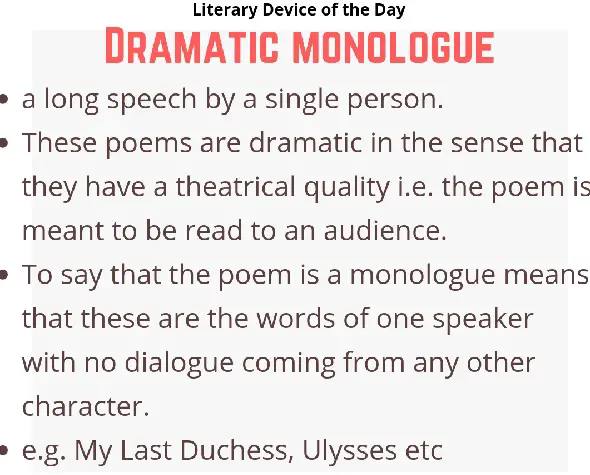Dramatic Monologue is one of the most effective literary devices in different aesthetics and didactics. In a dramatic monologue, the speaker’s character is distinguished from the poet’s. The double meaning which lies in a dramatic monologue expresses the speaker’s version of different feelings or intentions.
The dramatic monologue has been practised for so many years, but it was Browning who recognized the structure which was already existing and took it to a deeper level of meaning. Generally, this kind of poem is spoken in a critical sphere of the narrator’s life.
The presence of a silent listener makes the sayings more significant. It offers a great insight into the temperament, feelings, and character of the speaker. Browning tried his hands initially on the drama but the interest in human psychology and human mind led him to show his mastery over the dramatic monologue.
The main features of Browning’s dramatic monologues are that the readers part as the silent listener in the poem, the speaker talks about a case and makes it argumentative and we complete the poem from inside by using our imagination power.

Features Of Browning’s Dramatic Monologue
In most of Browning’s poems, we can find a sole speaker. For example, in ‘Fra Lippo Lippi’, Lippo speaks to the watchman. The soul of a man was the main thing of interest for Browning. Despite the human actions or misdemeanours, Browning reflected the human problems in his poems.
His characters are both moral and brutal. There is a silver lining in between those characteristics and that’s the most exciting thing about Browning.
Browning offers an absolutely different experience than Wordsworth or any other lyrical poets. The speaker’s psychology is the main subject in Browning’s monologues. It gets expressed by the imaginative sympathy of the poet.
Different Shades Browning’s Dramatic Monologue
This particular form of poetry allowed Browning to maintain a proper distance between himself and his marvelous creations. He was actually expressing the voice of the narrator.
It can be said that he exposed the evil in an astonishing way even without being evil. The characters Browning created actually reflected different images. That’s why he was able to adopt different stories and traits.
These monologues worked as a tool to observe serious issues which have always been overlooked. Domestic abuse and religious hypocrisy are the most attempted genres of Browning. From W.B.Yeats to Ezra Pound, even T.S.Eliot was influenced by Browning’s monologue.
There are some particular characteristics that can be found in the speaker of Browning’s monologue. He is often aggressive and threatening, always superior by all means, especially intellectually and socially, to the listener. Generally, he is an eloquent rhetorician who is even capable of lying. The speaker is so smart that he uses his words to know the listener’s perception.
My Last Duchess
My Last Duchess is one of the best illustrations of Browning’s psychological analysis. The depiction of the character ‘Duke’ proves the mastery of Browning in this field. The villainous character of the Duke of Ferrara with a lot of aesthetics creates a high tension.
And the tension has been exploited to the fullest By Browning. The duke clearly tries to impress the emissary by his twisting insinuation and overpowering bullying.
Browning often allows his characters to reveal their own behaviours in a smart way. The duke is doctorial and desires absolute submission from his duchess. Ruffled by the spirit of freedom of the duchess the duke complains that she ‘was too easily impressed’ by anyone.
Disturbed by the flirtatious nature of the duchess then ‘he gave commands’ and ‘all smiles stopped together’. The duke couldn’t control his duchess while she was alive, but in her death, he has all control over her. Here the monologue reveals that the duke values only those beautiful things which he can control.
Porphyria’s Lover
This poem is another jewel made by Browning which portraits violence in a beautiful manner. Overcoming all the social and physical barriers, Porphyria goes on to meet her insane lover. On the other hand, the lover, filled with pride and joy, tried to eternalize that very moment.
The lover murdered his lady love by tightening her hair around her neck. He was so self possessive that he thought she felt no pain when he was murdering her, “No pain she felt/I am quite sure she felt no pain”. The brutal love has been reflected barely in this particular monologue by Browning.
Commentary On Browning’s Monologue
These are just some of the so many marvellous monologues written by Robert Browning. ‘Fra Lippo Lippi’, ‘Andrea del Sarto’, ‘The last ride together’ etc. has got some real issues to deal with.
These monologues aren’t complete without the participation of the reader. That’s why the reader must fulfil it with his excessive imagination power.
What Porphyria’s lover was expecting to hear from God? What the duke was going to do next? These are the questions that ultimately made the monologues famous. So, it can be said that Browning wrote the monologues in a peculiar and mesmerizing manner that will surely win the minds of the readers.